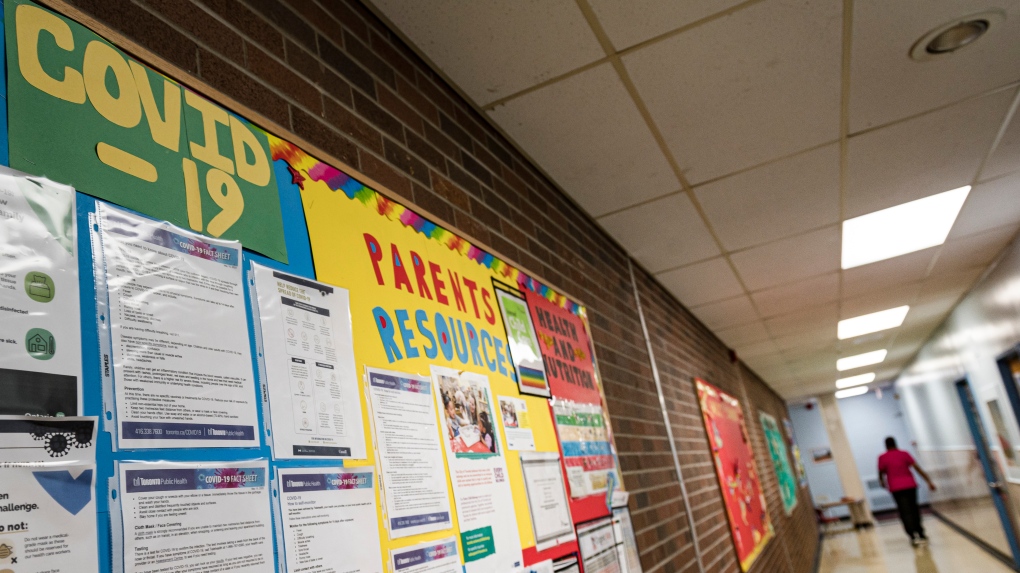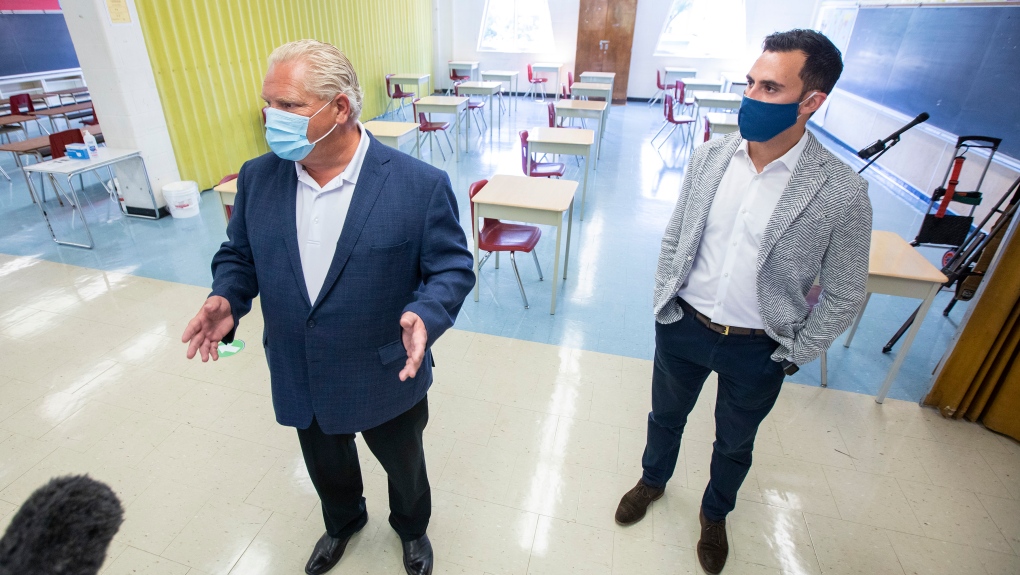Group of Ontario parents boycott remote learning in the face of new public health restrictions
A group of more than 3,000 people have joined an online group saying they are boycotting the Ontario government’s shift to remote learning because they believe it is harmful to their children.
The Facebook group, which has 3,400 members as of Friday afternoon, has been using the hashtag #dontlogon as a rallying cry for parents who are now forced to pivot to online learning for the fourth time during the COVID-19 pandemic.
“We’ve chosen not to go online,” one parent, Lisa Donegan Baetz, told CTV News Toronto on Friday. “Weighing the stress over the value of what type of education they are actually getting online, our decision was we have to walk away.”
The Hamilton mother of two, whose children are in Grades 1 and 3, joined the group when there were just 23 members and admits she and her husband have struggled to balance online schooling, their own full-time jobs, and life in general during the first three rounds of remote learning.
“Removing online [learning] at least removes all of the extra things that the parents are required to do -- that parents need to do -- to support their children and removes all the frustration and stress on our children when everything doesn’t go ahead as planned,” she said.
On Monday, Premier Doug Ford announced that his government would be closing schools until at least Jan. 17 to avoid potentially overwhelming the province’s hospitals with COVID-19 patients.
"The level of absenteeism we're seeing in other sectors tells us with absolute certainty that operating schools, ensuring teachers are on the job and not home sick, will be a challenge we cannot overcome in the short-term,” Ford said at the time.
Prior to Monday’s announcement, Ontario’s Chief Medical Officer of Health Dr. Kieran Moore had said on Dec. 30 that the province would delay the return to school by two days to allow boards more time to deploy additional safety measures.
When asked about the group of parents boycotting online learning, a spokesperson for the Ministry of Education acknowledged how challenging learning from home can be for kids and their parents.
“We know parents and students are facing great levels of difficulty navigating through this global pandemic,” spokesperson Caitlin Clark said in a statement to CTV News Toronto. “We believe it’s important students continue to access their teacher — which is why we have mandated that at least 70 per cent of the day must be live-instruction to keep students learning and engaged in the curriculum.”
“We have also extended school-based academic and mental health supports to students. We’ll continue to build upon investments that have enhanced ventilation in all schools, in addition to the deployment of N95 masks to staff and three-ply masks to students, and accelerated access to booster doses of the vaccine, with a focus on getting students back to class.”

To substitute for online learning, Baetz said she is working with her children using tools like educational apps, books, and one-on-one instruction.
“We’re trying to make it work the best we can. Unfortunately, there’s a lot of families that can’t. There’s families that are leaving their kids at home because they have a job and they can’t work from home,” Baetz said.
Oxana Roma, another Hamilton mother of two, said she decided to pivot away from online learning for the benefit of her son who she said is “suffering” as a result of the teaching method.
“He misses the routine, seeing his friends, he misses seeing his teacher,” Roma told CTV News Toronto. “I don’t know how much a five-year-old is really learning over a computer when he’s at home with all sorts of distractions. What kind of education is that?”
Roma and her husband are both essential workers and, like Baetz, they say they are trying their best to keep their children’s education going.
In October, a study published to the Journal of Psychoeducational Assessment highlighted the emotional toll remote learning can have on students.
The study, dubbed “In-Person Versus Online Learning in Relation to Students’ Perceptions of Mattering During COVID-19: A Brief Report” found that Canadian children who learned remotely during the COVID-19 pandemic reported they felt they “mattered less” than their peers who studied in-person.
Researchers behind the study said at the time that much attention had been paid to how effective online learning can be in an effort to blunt virus transmission, but they argued that not much consideration had been made to the social and emotional implications of the method of teaching.
Schools are expected to stay closed until at least Jan. 17.
In an open letter to Premier Ford and Education Minister Stephen Lecce published Friday, the Canadian Paediatric Society, the Pediatrics Section of the Ontario Medical Association and the Pediatricians Alliance of Ontario urged the Ontario government to resume in-person learning no later than that date.
The group said they understand that the Omicron variant of COVID-19 is overwhelming hospitals and governments need to take action.
However, they added that, "certain decisions and measures pose a far greater risk to children and youth than the virus itself."

Since the beginning of the pandemic, 156,073 children between the ages of 0 and 19 have tested positive for COVID-19, according to data from Public Health Ontario. That’s resulted in 708 (.45 per cent) children in the same age cohort being hospitalized with COVID and eight (0.005 per cent) children dying with the disease.
In the past two weeks, two children under the age of 10 have died with COVID-19, although the circumstances surrounding both deaths are still not known.
Speaking at a news conference on Thursday, Dr. Moore offered his condolences to the families of the deceased children before adding that death of children is “exceptionally rare from this virus.”
CTVNews.ca Top Stories

More than 115 cases of eye damage reported in Ontario after solar eclipse
More than 115 people who viewed the solar eclipse in Ontario earlier this month experienced eye damage after the event, according to eye doctors in the province.
B.C. seeks ban on public drug use, dialing back decriminalization
The B.C. NDP has asked the federal government to recriminalize public drug use, marking a major shift in the province's approach to addressing the deadly overdose crisis.
Last letters of pioneering climber who died on Everest reveal dark side of mountaineering
George Mallory is renowned for being one of the first British mountaineers to attempt to scale the dizzying heights of Mount Everest during the 1920s. Nearly a century later, newly digitized letters shed light on Mallory’s hopes and fears about ascending Everest.
Orca calf that was trapped in B.C. lagoon for weeks swims free
An orca whale calf that has been stranded in a B.C. lagoon for weeks after her pregnant mother died swam out on her own early Friday morning.
Sophie Gregoire Trudeau on navigating post-political life, co-parenting and freedom
Sophie Gregoire Trudeau says there is 'still so much love' between her and Prime Minister Justin Trudeau, as they navigate their post-separation relationship co-parenting their three children.
'I was scared': Ontario man's car repossessed after missing two repair loan payments
An Ontario man who took out a loan to pay for auto repairs said his car was repossessed after he missed two payments.
Powerful tornado tears across Nebraska, weather service warns of 'catastrophic' damage
Devastating tornadoes tore across parts of eastern Nebraska and northeast Texas Friday as a multi-day severe thunderstorm event ramped up in the central United States, injuring at least three people.
Toxic testing standoff: Family leaves house over air quality
A Sherwood Park family says their new house is uninhabitable. The McNaughton's say they were forced to leave the house after living there for only a week because contaminants inside made it difficult to breathe.
Trump's lawyers try to discredit testimony of prosecution's first witness in hush money trial
Donald Trump's defence team attacked the credibility Friday of the prosecution's first witness in his hush money case, seeking to discredit testimony detailing a scheme between Trump and a tabloid to bury negative stories to protect the Republican's 2016 presidential campaign.































